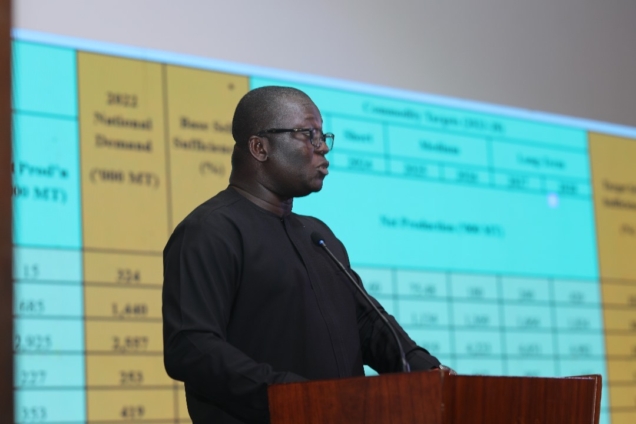Agriculture Minister Bryan Acheampong has assured Ghanaians of the capacity of his outfit to handle the food security needs of the country.
Dr. Bryan said this when he addressed farmers and financial institutions at a Presidential Breakfast Meeting on Agriculture and Agribusiness Financing in Accra.
The Minister indicated that Ghana can boldly say and boast that it will be food-secured and resilient in five years.

He, however, lamented the embarrassing narratives, like importing onions and tomatoes from the Sahelian regions, He affirmed his commitment to reverse the trend as soon as possible.
The enormity of leading the charge to transform Ghana’s agriculture through the new strategy has never been lost on me, right from the inception of my stewardship,” he added.

He expressed positivism of the existing potential of the agriculture sector, which should easily change the fortunes of Ghana if fully tapped.
They include; abundant arable land for crop production, especially the virgin valleys suitable for rice production, good soils for the production of a variety of crops, across the country, water resources for irrigation, favourable weather, and a diversity of food commodities that provide numerous avenues for job creation along the agriculture value chain, to mention a few.

The Minister also indicated how PFJ 2.0 will work as an intervention on a sound footing. According to Dr. Bryan statistics have it that, for poultry, Ghana consumes a total of 324,000 MT, and is only able to produce just about 15,000 MT, implying a woeful self-sufficiency of under 5%.
In the five-year plan of PFJ 2.0, Ghana is expected to move its self-sufficiency from 5% to 7% by the end of 2023, and to 13% in 2024, and progressively attain full self-sufficiency of 110.6% by 2028. Specific steps have been taken in this regard.
In this conclusion, Dr Bryan announced that, in the immediate term (October to December 2023), MoFA is supplying 4.5-million-day-old chicks, vaccines, and starter-pack feed to anchor farmers and their out-growers.
This intervention will result in the production of an additional 13,200 MT of poultry meat by the end of this year, which will increase Ghana’s self-sufficiency to 7%.
In 2024, he said the ministry will ramp the poultry sector up with support to 18 million day-old chicks, vaccines, and starter-pack feed, which will lead to the production of 42,600 MT of meat and increase our self-sufficiency to 13%. This trajectory will continue until we reach full self-sufficiency.
Plans are also advanced to revive the poultry industry this year through the rehabilitation of 300 outgrown poultry farms across the country over the next 12 months.
Each of these farms can be scaled to produce 200,000 birds within each poultry cycle of 4 months.
Latest Stories
-
Ghana and Seychelles strengthen bilateral ties with focus on key sectors
8 mins -
National Elections Security Taskforce meets political party heads ahead of December elections
11 mins -
Samsung’s AI-powered innovations honored by Consumer Technology Association
31 mins -
Fugitive Zambian MP arrested in Zimbabwe – minister
49 mins -
Town council in Canada at standstill over refusal to take King’s oath
60 mins -
Trump picks Pam Bondi as attorney general after Matt Gaetz withdraws
1 hour -
Providing quality seeds to farmers is first step towards achieving food security in Ghana
1 hour -
Thousands of PayPal customers report brief outage
2 hours -
Gary Gensler to leave role as SEC chairman
2 hours -
Contraceptive pills recalled in South Africa after mix-up
2 hours -
Patient sues Algerian author over claims he used her in novel
2 hours -
Kenya’s president cancels major deals with Adani Group
2 hours -
COP29: Africa urged to invest in youth to lead fight against climate change
2 hours -
How Kenya’s evangelical president has fallen out with churches
3 hours -
‘Restoring forests or ravaging Ghana’s green heritage?’ – Coalition questions Akufo-Addo’s COP 29 claims
3 hours

